Conversations with our trainees — you asked, we answered!

What’s one word to describe the vibe of your program?
“Collegial." This is a program with a truly team-oriented attitude, not only among the residents, but with the fellows and attendings. It’s not uncommon to have a fellow or even an MFM provider pick up the slack in L&D triage when we’re getting bombarded with preeclampsia and labor checks. Duke has such an approachable and collaborative group of people, all dedicated to providing excellent care to patients and support one another.
What kind of applicant is a good “fit?”
I would say there isn’t any one type of person that would be a good “fit” as a Duke resident. We have people from all sorts of cultures and backgrounds and a wealth of different personalities. The things we have in common: A desire to provide excellent patient care, a commitment to each other, a good attitude and a healthy sense of humor!
Can you talk about resources you have for residents interested in fellowship?
Sure can! First and foremost, Duke has fellowships in four ACGME subspecialties: Gyn Onc, MFM, REI and Urogyn. In this resident’s opinion, having a fellowship in your desired subspeciality is a huge boon in terms of research opportunities and networking when fellowship applications come around. We also have excellent faculty with national recognition in both Family Planning and MIGS as well in case either of those pique your interest.
Duke has a phenomenal reputation for training strong residents. Historically, half of trainees go on to become generalists. While some programs may train more residents to go on to fellowship, that focus on a broad generalist training means that every resident who trains at Duke comes out with the skills equipped to independently practice the full breadth of Ob/Gyn.
Finally, UME Director Dr. Dotters-Katz and Associate Residency Program Director Dr. Davidson run a “Road to Fellowship” program that incorporates mock interviews, personal statement review and other resources to support residents interested in fellowship.

How is resident research supported at Duke?
Every resident is expected to complete a Resident Research project as part of their training at Duke. This is a guided, longitudinal experience consisting of various milestones over the course of the 4 years. Residents present the objectives and methods for their projects as PGY2s and present their findings at the end of PGY3. All residents are expected to submit a manuscript based on their project. That said, many residents opt to pursue additional projects outside of the required track, often in collaboration with attendings, fellows, other residents and medical students. Resident research is supported through the Charles Hammond Research Fund via a grant application process, and all residents have protected time and travel funds to support presentations at conferences.
Can you please talk about the different clinical sites, and the patient population and amount of time spent at each?
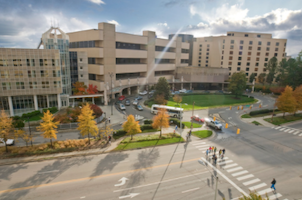
Duke University Hospital (DUH), or “Big Duke,” is the main tertiary care center. Patients come from across the state and, in some cases, the country for care at DUH. Most of your time as a resident is spent at DUH (~85%). The patient population is approximately 40% White, 30% Black, 20% Hispanic and 10% other. A large portion of patients at DUH are Medicaid or uninsured, leaving ample opportunity to work with underserved populations. L&D at DUH is a busy place, and a significant majority of patients are high risk.
Duke Regional Hospital (DRH), or “The Reg” (pronounced reeeej), is more a of a community hospital where residents spend approximately 10% of their time. In general, the pace is a little more laid back than Big Duke. At DRH, residents will perform c-sections, gyn surgeries and see consults, all while working with a mix of Duke attendings and a variety of private practices.
We recently started to work more at Duke Raleigh Hospital, primarily consisting of MIGS and Urogyn surgeries during the day, as well as the occasional consult. We also sometimes take home call at Raleigh for emergent ORs such as diagnostic laparoscopy for ectopic pregnancy and ovarian torsion.
Finally, there’s the Durham County Health Department and rural health departments. Residents primarily rotate at these sites during their first and second years, seeing a mix of outpatient gyn and routine prenatal care.
Would you say the training at Duke is more OB-heavy or GYN-heavy?
A good split! I would not say that Duke has a bias in either direction. With respect to OB, your experience at Duke will be predominantly high-risk — our OB continuity clinic is at the MFM office, after all. For GYN, our strength is likely the volume of laparoscopy we perform, both straight stick and robotic.
What sort of residency mentorship does Duke offer?
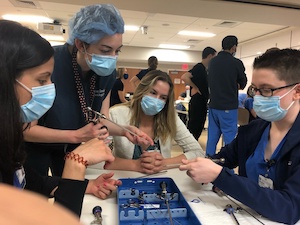
Good question! Residents have two formal mentoring programs, in addition to the informal mentoring that occurs along the way. Each resident is assigned a Faculty Mentor and a Coach. The Faculty Mentor is typically someone in your chosen track within ob/gyn and helps provide guidance toward each resident’s individual career goals. Resident meetings with their faculty mentor typically cover how rotations have been going, what feedback residents have received and areas where they are looking to improve and how their research and other endeavors are progressing. The Coach is more of a holistic guide, someone to help each resident become the best version of themselves in their personal and professional life. Of course, each of us has mentors outside of these formal capacities, such as a fellow or attending we’ve particularly bonded with or even a peer!
How do residents interact with each other? Are people friendly?
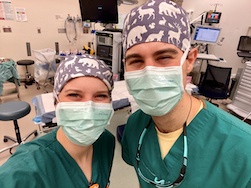
We are not friendly, and we do not interact with one another outside of work.
Just kidding. Where to begin! Residency is like your second family – or maybe your third or fourth or fifth depending on how many times you’ve been told this exact thing in a different context previously. We spend a healthy amount of time both at and outside of work with one another. There’s Hike Club, social gatherings, bar crawls, brewery nights, workouts, movie nights, potlucks and even the occasional cookie decorating with residents’ kids!
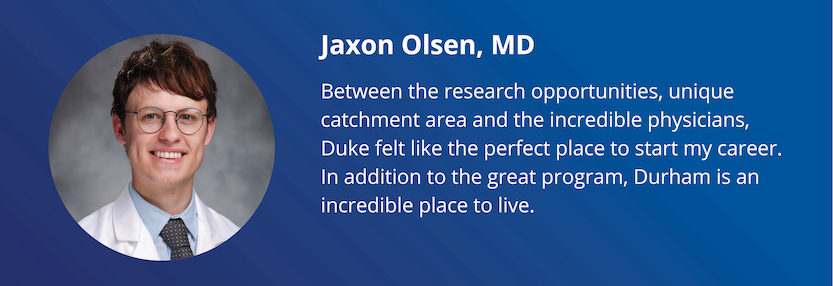
How much experience do residents get in subspecialties that have fellows?
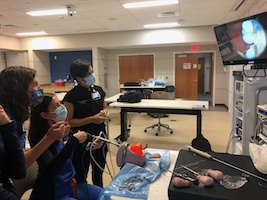
Residents get plenty of experience and operative time in cases with fellows. The fellows are excellent teachers and are great at facilitating hands-on opportunities for residents. The resident will generally perform the procedure up to their level of training before the fellow and attending take over. A good example is a robotic-assisted TLH/sacrocolpopexy with urogyn. The resident will typically perform their side of the hysterectomy and may even stitch some of the mesh into the vaginal cuff depending on their comfort and level of training. In general, fellows are a huge benefit to our education. The same is true for surgeries with gyn onc.
How are new interns supported in the transition into residency?
We have an intern bootcamp at the beginning of the year that covers the basics of using Epic and essential skills on labor and delivery. We also have a newly implemented intern school that runs the first few months of residency, which is run by upper-level residents and creates a great opportunity for the intern class to bond!
What is the family planning curriculum like?
The family planning division here is phenomenal! Lots of great exposure to contraceptive management and pregnancy termination/miscarriage management. The providers are such great mentors and advocates. It is often a favorite rotation for many second- and third-year residents, who work together over the course of the rotation. In addition to the hands-on experience afforded by patient care, there is an online Ryan Residency Program curriculum that the residents work through over the course of the rotation, and there is an article discussed each week with the residents and attendings.
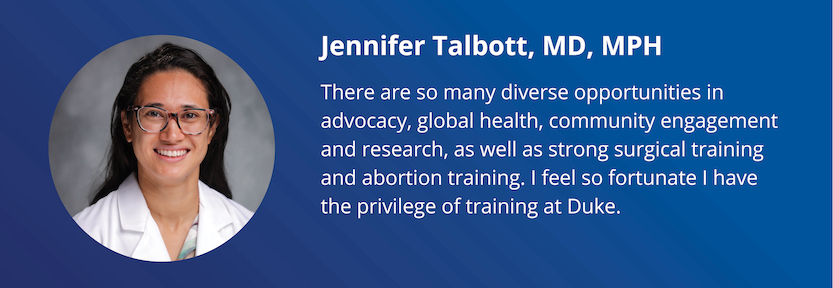
How early do the PGY1s get OR experience?
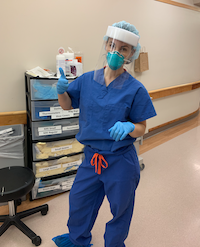
If you start at Duke Regional Hospital, you’ll be performing c-sections day 1! In the same vein, if you start on Benign Gynecology, then the same is true for minor procedures such as hysteroscopy, D&C, etc.
What opportunities exist to get involved in quality improvement and patient safety as a resident?
Each residency class is responsible for a class Quality Improvement project that occurs over the course of the four years of residency. Many residents with an interest in quality improvement and patient safety apply for positions on various practices and peer review committees to discuss challenging cases and ongoing initiatives. Additionally, there are numerous opportunities for research based on ongoing projects in each division, as well as health systems projects that emerge from residents’ own experience delivering patient care.